April eNews
Strengthening Capacity of CSO with Strategic Planning Training
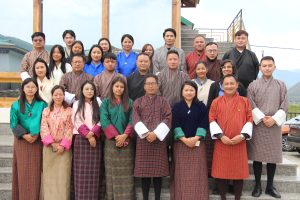
The Bhutan Centre for Media and Democracy (BCMD), in partnership with Deutsche Welle Akademie (DWA), successfully conducted a three-day training on Strategic Planning for Civil Society Organizations (CSOs), aimed at enhancing the capacities of CSOs to plan, implement, and evaluate programmes with greater coherence and impact.
A total of 24 participants from various CSOs took part in the training, exploring core strategic planning frameworks including the Theory of Change, Logical Framework Approach, and Results-Based Management. Participants critically examined fundamental components such as organisational vision, mission, and core values. Scenario-based exercises allowed them to apply these theoretical frameworks to the practical challenges they face within their organisations.
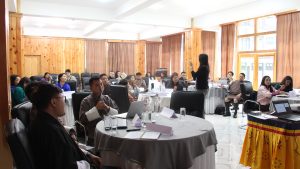
The sessions also deepened participants’ understanding of how to operationalise strategi c plans through practical sessions on designing SMART indicators and establishing robust Monitoring & Evaluation (M&E) systems. Hands-on group work provided CSOs with the opportunity to formulate Key Performance Indicators (KPIs), set realistic targets, and develop risk mitigation plans tailored to their unique mandates.
Importantly, the training underscored the need for strategic plans to ensure that each CSO’s work logically aligns with its organisational vision and effectively contributes to Bhutan’s national 13th Five-Year Plan development goals and the Sustainable Development Goals (SDGs).
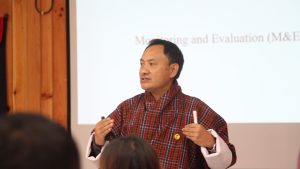
By the conclusion of the training, participants successfully synthesised their learning by collaboratively developing comprehensive strategic plans within their respective groups. Drawing on the insights and outputs generated over the three days, each group integrated key elements of strategic planning into coherent and actionable frameworks.
With renewed vision and actionable plans, participating CSOs are now better equipped to lead inclusive, impactful development efforts across Bhutan.
This training was part of the EU-funded project, Building Inclusive Democracy: Civil Society, Parliamentarians, Media and Youth Strengthen Good Governance in Bhutan.
Training Parliamentarians on Gender, Minority Inclusion, and Citizen Engagement
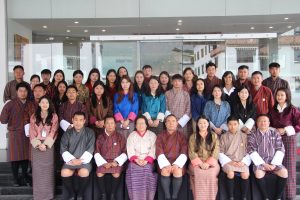
On 28th April, the Bhutan Centre for Media and Democracy (BCMD), in partnership with Deutsche Welle (DW) Akademie, organised a one-day training in Thimphu on Gender and Minority Inclusion, Public Participation, and Citizens’ Engagement.
A total of 34 Members of Parliament from the National Assembly and National Council, along with Secretariat staff, took part in the training. The session delved into the conceptual foundations of inclusion, examining structural and cultural barriers that hinder the full participation of women, persons with disabilities, and other vulnerable communities in Bhutanese society.
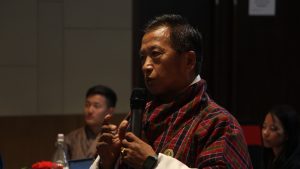
Key discussions highlighted the persistent gap between policy and practice, including the underrepresentation of women in political and economic sectors and the social stigmas still faced by persons with disabilities.
Drawing on global best practices from countries such as Bolivia, the session introduced participants to transformative approaches such as constitutional reforms, gender parity laws, and quota systems, sparking dialogue on their relevance in the Bhutanese context. The benefits of an inclusive society in national and global development were presented through the successes of mixed teams across various sectors in economic, social and political areas.
The training also explored the challenges of civic engagement from geographic isolation and limited digital literacy to deeply rooted cultural norms. Participants proposed strengthening participatory platforms through civic education in schools and enhancing the roles of media, civil society organisations, and local governments.
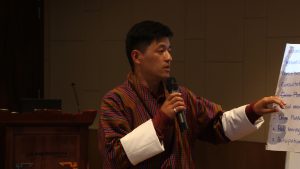
This timely engagement allowed for reflection on Bhutan’s commitments to both national and international frameworks for inclusion and good governance. It also allowed acknowledging the government’s actions and initiatives towards enabling achievement of the commitments as well as the gaps.
This was implemented with support from the EU-funded project, “Building Inclusive Democracy: Civil Society, Parliamentarians, Media and Youth Strengthen Good Governance in Bhutan.”
Youth Summit Programme 2025
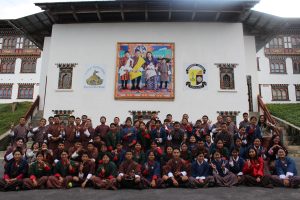
Sherubtse College hosted the Youth Summit Programme 2025 over the weekend of 19th and 20th April organised by the Bhutan Centre for Media and Democracy (BCMD). The two-day residential programme brought together 60 students aged 12 to 18 from Rangjung Central School, Jampeling Central School, and Trashigang Middle Secondary School, providing them with a vibrant platform to explore civic rights, media literacy, and active citizenship.
Throughout the summit, participants engaged in a range of interactive activities including the Power Walk, open-floor discussions, and group exercises. Using tools such as the ‘But-Why’ and ‘Problem Tree analysis’, the students explored root causes of pressing youth issues, from unemployment and lack of sports facilities to social anxiety, overreliance on AI and social media, peer discrimination, and cyberbullying. These sessions encouraged critical thinking and reflection, allowing participants to share their own experiences and learn from one another.
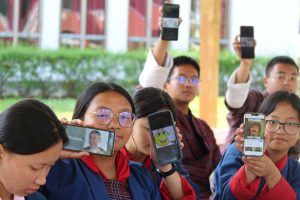
Students also reflected on their roles as active citizens, recognising both their rights and responsibilities, and envisioned ways they could help build more inclusive and supportive communities. Through creative drawing exercises, they imagined their ideal communities, and during group presentations, they proposed thoughtful solutions to the issues discussed — demonstrating creativity, insight, and a strong sense of social responsibility.
BCMD extends its heartfelt gratitude to the Australian Government, Department of Foreign Affairs and Trade for their generous support in making this event possible. Special thanks also go to the Trashigang Dzongkhag Administration and the Department of School Education for their role in facilitating school participation, as well as to Sherubtse College, Royal University of Bhutan, for graciously hosting the event and providing a safe and enriching space for the students.
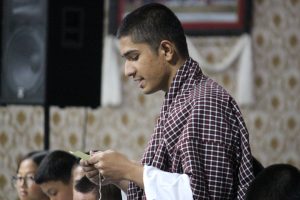
With the continued support of our partners, the Youth Summit serves as an important platform for amplifying young voices, nurturing youth leadership, and fostering a more engaged and informed generation of Bhutanese citizens.
Situation Analysis for Community-Based Integrated Programming in Samtse, Chukha and Dagana
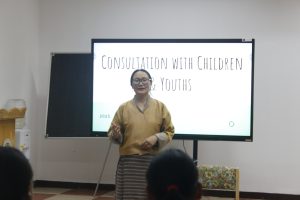
The Bhutan Centre for Media and Democracy (BCMD) conducted a series of consultations with Children and Youth as part of UNICEF’s integrated programming approach in partnership with local governments, relevant ministries and stakeholders for the target local governments of Chukha, Dagana and Samtse. The focus of this multisectoral action is intended to create sustainable, long-term impacts that align with the priorities outlined in the 13th Five-Year Plan for the three targeted districts in a coordinated manner to enhance outcomes for children and communities.
The districts of Samtse, Chukha and Dagana were identified collaboratively by the UNICEF country office and the Government under this project and reflects strong governmental commitment to addressing the holistic needs of children and adolescents, and their well-being and community outcomes.
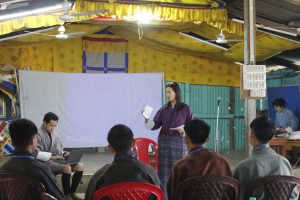
Under Samtse, 38 participants aged 13-17 (children) and 18-24 (youth) from the six gewogs of Dumtoed, Dophuchen, Trading, Namgaychhoeling, Norgaygang, and Sangngagchoeling were consulted. In Chhukha, consultation was carried out with 20 youth from the gewogs of Doongna, Bongo and Getena on 26-27 April. The group included students, school dropouts, and persons with disabilities from the identified gewogs.
The consultation is aimed at gathering insights from young people on six key themes that affect them —education, health and hygiene, social protection, poverty, climate change and WASH, and participation. Through focus group discussions, thematic presentations, and hands-on workshops involving the children and youth themselves, participants identified issues affecting them and other children and young people in their communities, analysed root causes and possible effects using problem tree analysis, and proposed solutions based on their lived experiences.
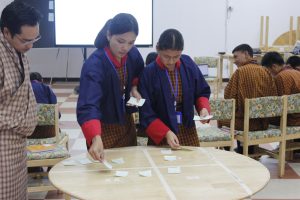
The use of a Frequency-Severity Matrix also encouraged critical thinking and prioritisation of issues. The consultations revealed gaps in awareness between urban and rural youth and highlighted the importance of inclusive participation and targeted interventions in undertaking policy discourse and awareness among the cohort that is instrumental in shaping policies. The findings from these consultations will be documented and shared with the UNICEF Country Office to inform them in formulating an integrated programme and providing targeted policy interventions in the identified districts and gewogs. The recommendations will further be used in informing and supporting the government’s work in the area of children and youth development.
Consultation for the remaining five gewogs under Dagana (Khebisa, Lajab, Tashiding, Tsankha, Karna) will be carried out in the following weeks.
This initiative is supported by the UNICEF Bhutan Country Office.
